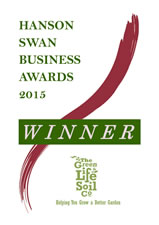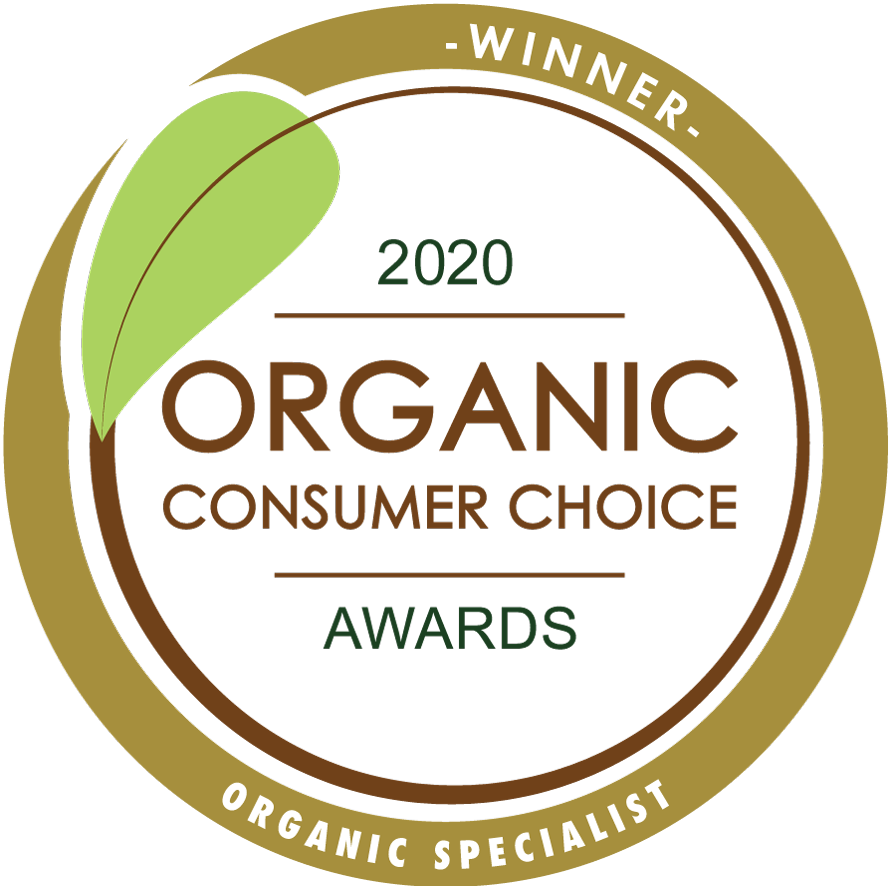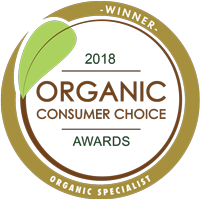| item(s), Total: $0.00 View Cart |
| Shopping cart is empty. |
Hello Green Lifers!
It's been such a topsy-turvy year but we're very pleased to be here, helping new (and not so new) gardeners experience the magic of having a biodiverse garden, and (for many at least) a garden that provides their family with fresh and healthy food. Since the Covid-19 farmageddon, we've been closed on Sundays. I'm sure this has been a bit of an annoyance for some of you, but on a personal level, it's given Paul and myself some regular downtime, and our garden is certainly showing the benefit this year. We've been picking broccoli, lettuce, silverbeet, english spinach, bok choi, coriander, spring onions, chives and are waiting (not so) patiently for cauliflower, cabbage, peas, broad beans, kohl rabi, leek, turnip, carrot, potato, beetroot, garlic crops to come on strong - plus waiting with bated breath to see whether we get brussel sprouts again this year! We might have been a little late getting them in - it's always a gamble. We've had very little pest damage on any plants so far (touch wood). I've noticed since we've built up a range of shrubs around the vegie garden, we get so many more small birds visiting. They boldly flit around us, and I'm sure take out a huge number of moths, grasshoppers and other bugs - doing much of the pest control for us. I do admit to using the iron based snail pellets from time to time to control slugs and slaters (strangely - we don't get many snails, but HEAPS of disgusting slugs!). Previous years we've had issues with aphids and vegetable weevils - but this year no obvious signs. I know it's the benefits of healthy soil and a little bit of luck - but the extra attention is also paying dividends, and I'm keeping on top of weeds. They say the best fertiliser is a gardener's shadow - and there's definitely truth there!
You may remember back at the start of this year in response to the devastating bushfires endured by much of Eastern Australia, we announced we would be donating a proportion of profits from all bags sold for the months of January & February for bushfire relief? With 70% being donated to the Red Cross Disaster Relief Fund & 30% to WIRES (wildlife) rehabilitation. We're pleased to announce that we've completed donations of $850 to The Red Cross & $350 to WIRES. So THANK YOU for your support ~ every little bit helps with these organisations who have so much work to do for months and years to come to help rebuild lives and habitat. New products ~ remember our NEW range of Herbon and SWAP natural personal & cleaning products is in store & available online, too. Fragrance free cleaning products are designed for those with chemical sensitivities and are low allergy, suitable for those with eczema and asthma ~ and are Vegan friendly. Check out our 'Household Products' tab and scroll through. (VIP members - log in for your special pricing on these items.) Being winter - don't hibernate away! We hope this newsletter will inspire you to at least get out between the showers and spend some time 'talking to your plants' and enjoying your garden. We look forward to seeing you soon @ the Green Life Soil Co. Happy Gardeing! In this newsletter we have:
Pests & Diseases - Bean Leaf-roll Virus (BLRV)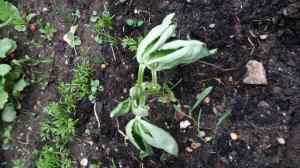 Something we've seen a bit in the last few years is people asking why the growing tips of their Board Bean plants are curling upwards and looking stunted & a little deformed. This led me to do a bit of research, and I'm of the opinion that we're seeing Bean Leafroll Virus in Perth. It seems to have been first found in Australia about 20 years ago. Spread mainly by aphids, it causes twisted, curled growing tips and can effect bean production by about 50% or more. Something we've seen a bit in the last few years is people asking why the growing tips of their Board Bean plants are curling upwards and looking stunted & a little deformed. This led me to do a bit of research, and I'm of the opinion that we're seeing Bean Leafroll Virus in Perth. It seems to have been first found in Australia about 20 years ago. Spread mainly by aphids, it causes twisted, curled growing tips and can effect bean production by about 50% or more.The good news is, it isn't spread from seed or soil - so if your bean plants are displaying symptoms, you have the choice of ripping them out or seeing how well they do (my recommendation). Destroy the plants after they've cropped, and if you save your seed, it will be interesting to see how next year's crop fares... Keep an eye out for any sign of pests/aphids and jump on it ASAP.
We'd be happy to hear from you if you've experienced this problem - let us know if you get a decent harvest later in the year. To read more about BLRV click here.
What to plant NOW in your gardenSome things you can plant in your garden NOW are:- 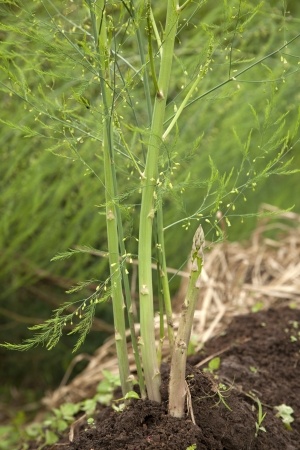 Artichokes (globe & Jerusalem types), Asparagus, Beetroot, Broad Beans, Broccoli, Cabbage, Celery, Celeriac, Coriander, Endive, English Spinach, Kale, Kohl Rabi, Lettuce, Mint, Onion, Parsley, Peas, Potatoes, Radish, Silverbeet, Snow Pea, Spring Onion, Strawberries, Turnip. Artichokes (globe & Jerusalem types), Asparagus, Beetroot, Broad Beans, Broccoli, Cabbage, Celery, Celeriac, Coriander, Endive, English Spinach, Kale, Kohl Rabi, Lettuce, Mint, Onion, Parsley, Peas, Potatoes, Radish, Silverbeet, Snow Pea, Spring Onion, Strawberries, Turnip.It's a little borderline now whether you can grow winter crops from seed... it's always worth a try if you're feeling lucky! Otherwise, look for healthy seedlings to plant out. You'll be saving yourself 4-6 weeks minimum, so you'll be picking your crops sooner. If Spring (and hot weather) is early - you'll want to make sure you get a harvest asap. Another tip is to select dwarf or small growing varieties - they tend to fruit quicker as they don't have to spend as long growing to their maximum size before flowering. Check out our FREE downloadable 'When to Plant in Perth' guide here. We've got one for vegies & another for herbs ~ as well as heaps more info on individual vegies, natural pest control, building healthy soil and SO much more!!! If you're stuck inside due to inclement weather - spend some time and explore what we've got for you. We're expecting Rhubarb & Asparagus crowns to arrive about mid/end July. Please give us a call (or keep an eye on our Facebook page) to confirm stock has arrived. (Click on the highlighted text for growing guides on these great perennial plants.) Birds & Bees & Bats & Bringing Beneficials (Biodiversity, Baby!)Birds
The downside is that grapes and berries and other soft fruit make it onto their dietary list... so bird netting is essential if you wish to enjoy a bountiful harvest of sweet treats. Traditional bird netting has spacing about 1.5cms apart, which can be a problem with small birds and animals being caught (and suffering as they cut themselves attempting to escape). A smaller mesh of < 0.5cms is more wildlife friendly; so perhaps you could consider insect netting, which is finer again and will provide protection from fruit fly as well as birds. It doesn't need to be permanently on your plants; just cover as fruit has formed, and definitely before it softens. The other option is to use individual covers/bags over fruit as it forms, rather than trying to cover the whole tree. That way it's possible to leave some (inaccessible) fruit for the birds, and yet protecting a share for you. Other wildlife to consider in your garden are lizards, spiders, snakes and frogs. (OK, I know you're not so keen on the spiders and snakes) but the reality is they're a valuable part of the food chain and do help in controlling slaters, slugs and snails. Natural areas you can leave well alone (assuming your yard is large enough) with logs, longer grass, etc. will provide good habitat. Frogs need water but not necessarily permanently. Check out the WA Museum's Frogwatch program to learn more about our precious native frogs. . Bees
Bees can be encouraged by planting a wide range of flowering plants (ideally making sure there's something in flower, no matter what time of the year), and by providing a source of water. A shallow bowl, filled with stones is ideal. Bees can safely land and drink without the risk of drowning. (Pictured above - European honey bee on a lavender flower.) If you're worried about stinging (honey) bees coming for water, watch their flight path. Usually, they're visiting from a hive so will come and go from one main direction. Place the water under this flight path, and away from areas you actively use. Ideally, raise it up high, so they're even less likely to bother you. And should a bee land on you - DON'T freak out. Stay still. The more you madly jump and wave about, the more likely you are to be stung in self defense, as the bee feels threatened. Usually they'll fly away within a few seconds, or if they're clambering on you, use a leaf or small stick and encourage it to hop on board, so you can safely remove it. Want to learn more about native bees? Check out this sheet produced by the WA Museum. Bats
Beneficial Insects
Other bugs are carnivorous - attacking and removing pest insects like aphids, whitefly and caterpillars. But here's the thing... everytime we reach for a treatment for these annoying garden pests, we're impacting the good guys too. Yes, even the organic treatments have a knock-on effect. So what's a gardener to do? Patience is the number one virtue. Normally, pests arrive. Their numbers build up and we begin to worry. But pest numbers need to build up before the predatory insects can find them! Hopefully sooner than later, they WILL arrive, and keep the pest numbers in check for you. Unfortunately there are no guarantees; I wish I could tell you otherwise. Sometimes organic gardeners lose entire crops to pests. But here's the thing. Next year, usually there'll be less of a problem, and the following year - even less again. I know of many experienced organic gardeners that will tell you it took a few years, but after deliberately leaving nature to sort itself out, they no longer have major infestations of anything.
ALWAYS use the least toxic approach. Try removing aphids by hand or with a strong jet of water. Band trees to prevent ants spreading scale. If you must use a treatment, make sure you have correctly ID'd the pest, and use a treatment that will successfully deal with it. Most commercial pesticides are broad spectrum, and are often systemic - meaning they're absorbed into the cellular structure of the plant to be more effective for longer. This means YOU can absorb the poison when you consume the vegie or fruit too. Organic treatments usually work by direct contact with the insect pest, or as a deterrent coating on the plant's surface. It will wash off with rain or reticulation, so generally needs to be more frequently applied. Direct contact sprays are useless unless you can physically cover the pest; but assuming your aim is good, they can be highly effective. So what can you grow in and around your garden to attract a range of pollinator and beneficial insects? There's a whole range of flowers and herbs (and some vegies) - including:- Brassicas. Your cabbage family - broccoli, bok choi, cabbage, kale, mustard, rocket, tatsoi are some examples. If growing them, allow a plant or two to go to seed at the end of their life. (Remember if you're wanting to collect seed, make sure you only allow one variety to remain, lest they cross pollinate and you end up with a hybrid form next time.) Insects will love you, and you may even be rewarded with a self-sown crop next year.
Top Tip: Plant a perennial basil somewhere in your garden (they will grow in a large pot). Perennial basil flowers almost year-round, and bees love it! It will help your fruit trees and vegies get pollinated, and you can pick the leaves to use as a regular basil substitute throughout winter. Win:win! Parsley, dill, fennel, angelica, yarrow, carrots are a few more to consider. These group with their large flat flower heads (called umbels) are particularly attractive to predatory insects like hoverflies and lacewings.
Daisy flowers (erigeron, margeurite, aster, brachyscome, sunflowers, calendular (pictured above) chamomile) are also excellent for bringing in pollinators. And the good news is, with careful plant selection, you can have something coming into flower all year around. Salvia, lavender, cosmos, alyssum (pictured below), marigolds, zinnias, stocks, coreopsis are some others... Plant your smaller annuals among your vegies. This will not only encourage pollinators but will help to confuse pests. If you have limited room, consider grow bags, hanging baskets or pots for your flowers. You can cycle them around your garden when in flower, and always have something coming into season.
Get to know your bugsCorrect ID is essential to know whether any insect is friend or foe. Don't automatically reach for the pest treatments until you're sure you need to. The WA Agricultural Department has a fabulous, free 'My Pest Guide App' which can help you identify many common insect pests. And the bonus of using it is that if it's something new and introduced - the Ag Department can help tackle it quickly and we'll all benefit. And, as already stated, correct ID is essential IF you do decide you need to use a treatment of some kind. Go out at night with a torch, carefully inspect the underside of leaves. More than once - catch the culprit/s in the act. Don't be "trigger happy!" ~ the wrong treatment will be a waste of time & money. Having a truly organic garden won't be the easy option - at least for a while. But take heart that with some perseverance you WILL get to enjoy healthy, spray-free vegies and know you're supporting a wide range of insects and animals as a result. VIP Special Offer
Valid until the end of July 2020. Online orders - please request the VIP deal in the 'delivery notes' section of your order. In store or phone orders - please ask our team member when you're making your purchase. Photo Competition WinnerCongratulations to Lisa from Morley who has sent in some pics from her garden. She had this to say: "Hi, Thank you Lisa for sending in your photos. I hope you enjoy your $50 credit with Green Life. Remember - you've got to be in it to win it - send in your photos and it might be YOU next month. There's a winner picked at random each month; so feel free to enter! Send your pics & a brief line about your garden (and what you're growing) either by email or via Facebook.
Retailer Stockist Update
|



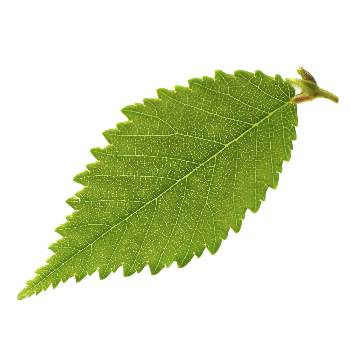 We're now in the middle of Winter; and while we've had some rain, there's also been some gorgeous sunny days. It really is a fabulous time to garden in Perth; without the harsh sun and heat putting our gardens under stress. We've passed the shortest day of the year now; so little by little, there's more daylight hanging around. Your plants will be noticing, and as the seasons turn it won't be long before Spring is here! The changing seasons really are wonderful, if we stop and take the time to observe nature!
We're now in the middle of Winter; and while we've had some rain, there's also been some gorgeous sunny days. It really is a fabulous time to garden in Perth; without the harsh sun and heat putting our gardens under stress. We've passed the shortest day of the year now; so little by little, there's more daylight hanging around. Your plants will be noticing, and as the seasons turn it won't be long before Spring is here! The changing seasons really are wonderful, if we stop and take the time to observe nature!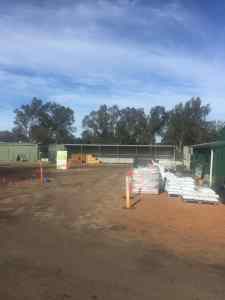 At Green Life's new home - we've been busy. A new "carport" has gone up, providing us with undercover areas to keep straw dry, protect excess stock pallets, and trailers. There's more infrastructure to come - we're chipping away at it as we can. It's like your projects around your home, coming down to time and money and conflicting priorities! Slowly but surely we've been re-doing some of the product photographs on our website to reflect newer packaging, new stock and to keep things looking uniform.
At Green Life's new home - we've been busy. A new "carport" has gone up, providing us with undercover areas to keep straw dry, protect excess stock pallets, and trailers. There's more infrastructure to come - we're chipping away at it as we can. It's like your projects around your home, coming down to time and money and conflicting priorities! Slowly but surely we've been re-doing some of the product photographs on our website to reflect newer packaging, new stock and to keep things looking uniform. 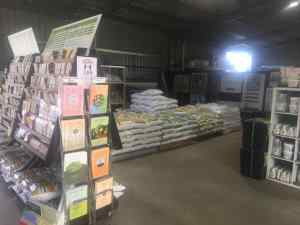
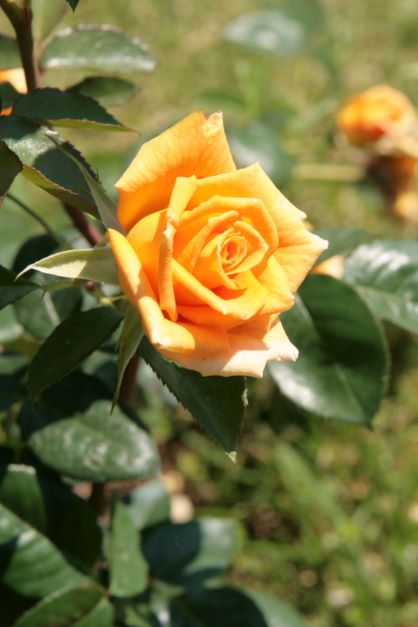 Prune your roses & deciduous fruit trees. It's always a bit difficult to say exactly WHEN it's pruning time in Perth - but have a look at your plants and see if you think they're telling you it's time! There's plenty of workshops, YouTube tutorials and articles on pruning - have a look at a few if you lack confidence - but the most important thing is to keep in mind the size and structure of how you're wanting the plant to grow. For fruiting trees, it makes sense to keep the branches at a suitable height for picking fruit, or netting fruit; and to keep the structure as open as possible for sunlight & airflow. It may pay to be aware of whether your trees will fruit on new wood or 2nd season wood, just so you maximise future crops. However - if a tree has been neglected and NEEDS trimming back you may have to wear one season's lack of fruit for future benefit of better yields.
Prune your roses & deciduous fruit trees. It's always a bit difficult to say exactly WHEN it's pruning time in Perth - but have a look at your plants and see if you think they're telling you it's time! There's plenty of workshops, YouTube tutorials and articles on pruning - have a look at a few if you lack confidence - but the most important thing is to keep in mind the size and structure of how you're wanting the plant to grow. For fruiting trees, it makes sense to keep the branches at a suitable height for picking fruit, or netting fruit; and to keep the structure as open as possible for sunlight & airflow. It may pay to be aware of whether your trees will fruit on new wood or 2nd season wood, just so you maximise future crops. However - if a tree has been neglected and NEEDS trimming back you may have to wear one season's lack of fruit for future benefit of better yields.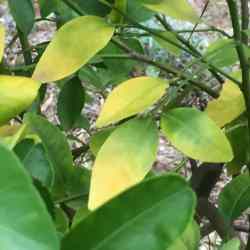 Watch for yellowing on your citrus trees. It's very common in Perth and usually is nothing to worry about; it tends to be seasonal in cold weather. Here's a link to our
Watch for yellowing on your citrus trees. It's very common in Perth and usually is nothing to worry about; it tends to be seasonal in cold weather. Here's a link to our 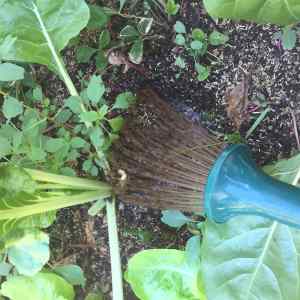 Feed your winter vegies. Keep your producing vegies going with weekly or fortnightly weak doses of liquid fertiliser - especially your leafy green crops. If you've got spring flowering bulbs growing - give them a feed too (potash is a good option) to encourage a lovely show of flowers.
Feed your winter vegies. Keep your producing vegies going with weekly or fortnightly weak doses of liquid fertiliser - especially your leafy green crops. If you've got spring flowering bulbs growing - give them a feed too (potash is a good option) to encourage a lovely show of flowers.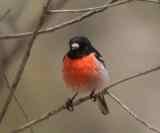 In the newsletter introduction, I mentioned we're benefiting from having lots of small birds in and around our garden. We never used to get too many - at least at ground level, because the garden was bereft of shrubs and lower growing plants when we moved in. Over time we've planted grevillea, mellaleuca, lavender, rosemary, thryptomene, and feijoa around our vegie garden (just to name a few). These have now matured to form bands of vegetation and an informal hedge in places. Silvereyes, honeyeaters, wrens and wagtails are now in abundance - busily catching bugs on the wing. The shrubs provide shelter and protection from larger, predatory birds. If you haven't got much space, consider growing some flowering shrubs in pots or planters. Make sure you've got a source of water nearby too and it won't be long until you've got feathered friends checking out what's to eat in your garden.
In the newsletter introduction, I mentioned we're benefiting from having lots of small birds in and around our garden. We never used to get too many - at least at ground level, because the garden was bereft of shrubs and lower growing plants when we moved in. Over time we've planted grevillea, mellaleuca, lavender, rosemary, thryptomene, and feijoa around our vegie garden (just to name a few). These have now matured to form bands of vegetation and an informal hedge in places. Silvereyes, honeyeaters, wrens and wagtails are now in abundance - busily catching bugs on the wing. The shrubs provide shelter and protection from larger, predatory birds. If you haven't got much space, consider growing some flowering shrubs in pots or planters. Make sure you've got a source of water nearby too and it won't be long until you've got feathered friends checking out what's to eat in your garden.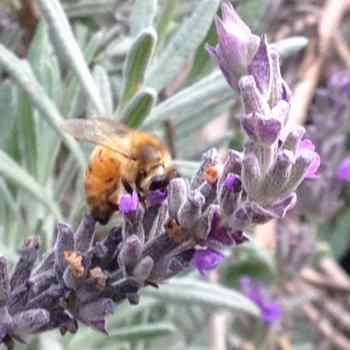 Australia is home to many amazing native bee species. They don't sting, and tend to be solitary creatures, laying eggs in cracks in trees/wood, and underground burrows. It's fabulous to see the awareness growing about many of our native bees finally. The popularity of 'insect hotels' in recent years is awesome. We have one at our place. It was put together by our son, and before we got a chance to hang it anywhere, it sat on an outside table. Very soon afterwards, we realised the native bees had already found it - and many of the little tunnels were being used. It filled up so quickly, we set up a 2nd one! Our WA native bees (there's thought to be around 2,000 species) don't look like the european honey bee. Some of our locals are tiny, and others look more like wasps. Some are very specific in their adaptation to host plants; others are more generalist and happy to visit many of our introduced plants in their search for nectar and pollen. Some of the most common are leaf cutter bees - their habit of cutting distinctive circular chunks out of rose leaves (they seem particularly fond of roses, but will have a go at some other plants) makes some people consider them a pest - but they're seasonal, do no permanent damage to your roses, and are a sign of healthy biodiversity in your garden. If you see the tell-tale circles on foliage (usually in Spring) - try to sit a while and carefully watch. Leaf cutter bees are stealthy and quick moving, but if you're patient, you can see them at work - which is really cool! They remove the leaf circle pieces to line their underground nests, making chambers in which they lay their eggs.
Australia is home to many amazing native bee species. They don't sting, and tend to be solitary creatures, laying eggs in cracks in trees/wood, and underground burrows. It's fabulous to see the awareness growing about many of our native bees finally. The popularity of 'insect hotels' in recent years is awesome. We have one at our place. It was put together by our son, and before we got a chance to hang it anywhere, it sat on an outside table. Very soon afterwards, we realised the native bees had already found it - and many of the little tunnels were being used. It filled up so quickly, we set up a 2nd one! Our WA native bees (there's thought to be around 2,000 species) don't look like the european honey bee. Some of our locals are tiny, and others look more like wasps. Some are very specific in their adaptation to host plants; others are more generalist and happy to visit many of our introduced plants in their search for nectar and pollen. Some of the most common are leaf cutter bees - their habit of cutting distinctive circular chunks out of rose leaves (they seem particularly fond of roses, but will have a go at some other plants) makes some people consider them a pest - but they're seasonal, do no permanent damage to your roses, and are a sign of healthy biodiversity in your garden. If you see the tell-tale circles on foliage (usually in Spring) - try to sit a while and carefully watch. Leaf cutter bees are stealthy and quick moving, but if you're patient, you can see them at work - which is really cool! They remove the leaf circle pieces to line their underground nests, making chambers in which they lay their eggs. 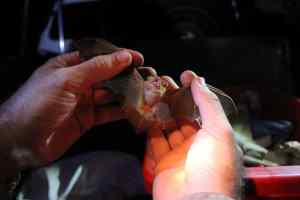 WA does not have large fruit bats that cause destruction and carry disease. But we DO have microbats! As the name suggests, these are tiny little critters - their body is about the size of your thumb, and wingspan around a small handspan. They're only active at night, so many of us have never seen them. Due to habitat destruction, they're less common around metro areas; although spots where there's trees and mosquitoes (around lakes and rivers) are prime candidates for bat habitat. Keep an eye out around street lights; they attract the bugs and moths, which in turn attract the bats. We have them in the hills, and in the very early evening, just at sunset, you can see them flit around the tree tops. They fly faster than birds - don't blink or you'll miss them. They are reported to eat thousands of mosquitoes per night, so they're very welcome in my opinion! Here's a link to more information on microbats. If you suspect they're around your area, you can make a bat box as a shelter - plans can be found online.
WA does not have large fruit bats that cause destruction and carry disease. But we DO have microbats! As the name suggests, these are tiny little critters - their body is about the size of your thumb, and wingspan around a small handspan. They're only active at night, so many of us have never seen them. Due to habitat destruction, they're less common around metro areas; although spots where there's trees and mosquitoes (around lakes and rivers) are prime candidates for bat habitat. Keep an eye out around street lights; they attract the bugs and moths, which in turn attract the bats. We have them in the hills, and in the very early evening, just at sunset, you can see them flit around the tree tops. They fly faster than birds - don't blink or you'll miss them. They are reported to eat thousands of mosquitoes per night, so they're very welcome in my opinion! Here's a link to more information on microbats. If you suspect they're around your area, you can make a bat box as a shelter - plans can be found online. 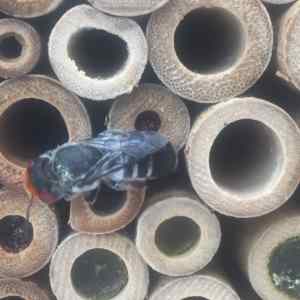 Bugs are a much discussed subject by gardeners. 'Bugs eating my garden' 'what bug is this?' are common questions we get at GLSC. But many bugs are in fact beneficial. Ants, beetles, flies, wasps and bees are all helpful in pollinating our flowers and crops. (Pictured right - a native resin bee inspecting our insect hotel.)
Bugs are a much discussed subject by gardeners. 'Bugs eating my garden' 'what bug is this?' are common questions we get at GLSC. But many bugs are in fact beneficial. Ants, beetles, flies, wasps and bees are all helpful in pollinating our flowers and crops. (Pictured right - a native resin bee inspecting our insect hotel.)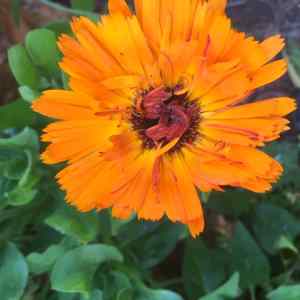 So be patient. At the very least, give it as long as you possibly can before intervening. The trouble with using treatments is you tend to create a see-saw of no pests/pests/no pests/pests - and of course beneficial insects get caught up in this cycle too. They will only proliferate if there's a reliable food source available.
So be patient. At the very least, give it as long as you possibly can before intervening. The trouble with using treatments is you tend to create a see-saw of no pests/pests/no pests/pests - and of course beneficial insects get caught up in this cycle too. They will only proliferate if there's a reliable food source available.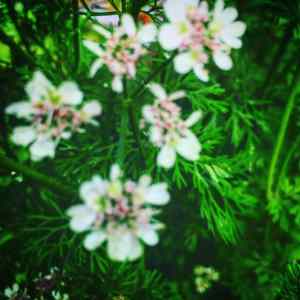 Lettuce, radish, coriander (pictured right, chives, basil, mint, lemon balm are other common vegies/herbs that insects love at flowering time.
Lettuce, radish, coriander (pictured right, chives, basil, mint, lemon balm are other common vegies/herbs that insects love at flowering time. 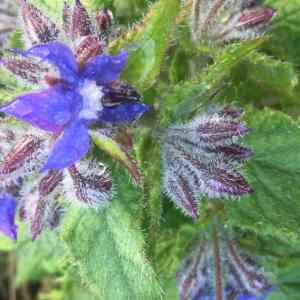 In Autumn/Winter, borage (pictured right) and nasturtiums are easy to grow flowering plants that provide food for bees and (in the case of nasturtiums) are also a good trap crop for cabbage butterfly. Their caterpillars LOVE tender nasturtium leaves, so if you're lucky, you may get them to leave your broccoli alone! Speaking of caterpillars, land cress (Barbarea vulgaris) is another good trap crop - reputed to be attractive yet toxic for them.
In Autumn/Winter, borage (pictured right) and nasturtiums are easy to grow flowering plants that provide food for bees and (in the case of nasturtiums) are also a good trap crop for cabbage butterfly. Their caterpillars LOVE tender nasturtium leaves, so if you're lucky, you may get them to leave your broccoli alone! Speaking of caterpillars, land cress (Barbarea vulgaris) is another good trap crop - reputed to be attractive yet toxic for them. 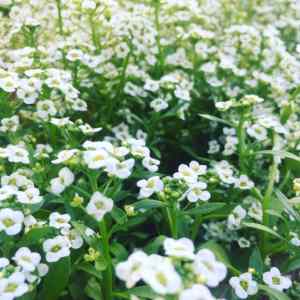 If you have the space, stack higher growing and ground cover flowering plants for great effect. Sow random flowering annuals thickly as a green manure crop. Use them as a living mulch around other plants to help smother weeds (I love nasturtiums for this!).
If you have the space, stack higher growing and ground cover flowering plants for great effect. Sow random flowering annuals thickly as a green manure crop. Use them as a living mulch around other plants to help smother weeds (I love nasturtiums for this!).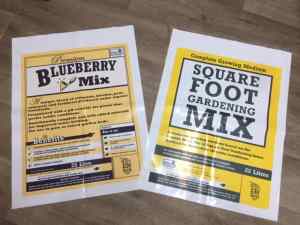 This month, to celebrate the arrival of two brand spanking new printed bags to our range (don't they look great?) - buy 5 bags of any of our soil mixes and receive a FREE bonus GLSC bag of your choice (to the same or lesser value).
This month, to celebrate the arrival of two brand spanking new printed bags to our range (don't they look great?) - buy 5 bags of any of our soil mixes and receive a FREE bonus GLSC bag of your choice (to the same or lesser value). 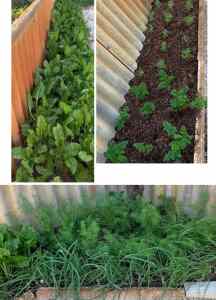
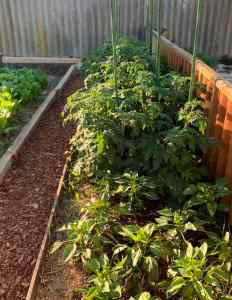
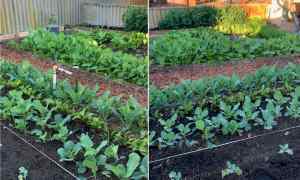
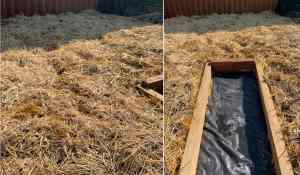
 There's never been a better time to support local small businesses - Please support the independent retailers who support us. They've got great local knowledge and are happy to help. Many are now bringing in pre-order & pickup/non-contact services in order to help keep you safe.
There's never been a better time to support local small businesses - Please support the independent retailers who support us. They've got great local knowledge and are happy to help. Many are now bringing in pre-order & pickup/non-contact services in order to help keep you safe.







